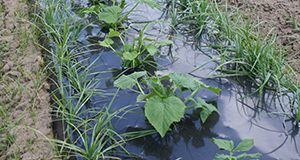
Summer squash is an important vegetable crop in Miami-Dade County. It is grown annually on about 6,000 acres and sold nationwide during the winter in the fresh market. This 16-page fact sheet describes the varieties of summer squash, land preparation and transplanting, what fertilizer to use, irrigation and freeze protection, disease management, insect management, weed management, harvest, and crop rotation. Written by D. Seal, S. Zhang, M. Ozores-Hampton, P. Dittmar, Y. Li, W. Klassen, Q. Wang, and T. Olczyk and published by the Horticultural Sciences Department.
http://edis.ifas.ufl.edu/tr012
Tag: Vegetable Production — Miami Dade County
Ejemplo Ilustrativo de los Costos y Rentabilidad de la Produccion de Aguacates en el Estado de la Florida
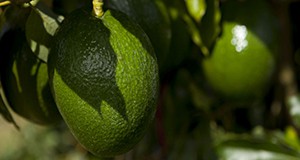
Los cultivos de árboles frutales son de gran importancia económica en la agricultura del estado de la Florida; en este segmento, la industria del aguacate ocupa el segundo reglón económico tras los cítricos. Aproximadamente el 80 por ciento de la cosecha se vende fuera del estado; por lo tanto, la industria aporta una cantidad considerable de “dólares nuevos” al estado, lo que resulta en un impacto económico total de cerca de $100 millones por año. Este artículo proporciona una estimación de los costos y rendimientos asociados a la producción de aguacate en el Condado de Miami-Dade y un breve análisis de la rentabilidad de la industria.
Written by Edward A. Evans and Ingrid Bernal Lozano, published by the UF Department of Food and Resource Economics in December 2014, and translated into Spanish in November 2015. The English version, titled Sample “Avocado Production Costs and Profitability Analysis for Florida,” is available at http://edis.ifas.ufl.edu/fe837. (UF/IFAS Photo by Tyler Jones).
http://edis.ifas.ufl.edu/fe970
Pest Management of Peppers in Miami-Dade County, Florida
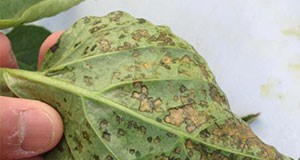
Pest management of peppers in Miami-Dade County is challenging because of a climate favorable to pests. To assist local pepper growers in maintaining crop productivity and improving the quality of produce, this publication illustrates common pests including major diseases and insects and recommends Integrated Pest Management (IPM) techniques, including host resistance, cultivation, sanitation, and physical, mechanical, biological, and chemical approaches, for effective pest management. This 8-page fact sheet was written by Qingren Wang, Shouan Zhang, Dakshina Seal, and Teresa Olczyk, and published by the UF Department of Plant Pathology, February 2015. (Photo: Shouan Zhang)
http://edis.ifas.ufl.edu/pp316
Pepper Production in Miami-Dade County, Florida
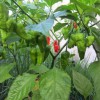 Pepper is an important vegetable crop in Miami-Dade County. Unlike other vegetable crops, peppers are relatively more adaptable to the environment, especially the heat, and are relatively easier to grow. But to be successful, careful attention must be paid to maintain healthy plants and high productivity with efficient management of soil and water for the particular needs of each variety or cultivar. This 7-page fact sheet provides general information and guidelines for pepper growers in Miami-Dade County, including major pepper varieties, and their horticultural traits, and fundamental soil and water management requirements. Written by Qingren Wang, Shouan Zhang, Yuncong Li, Dakshina Seal, Waldemar Klassen, and Teresa Olczyk, and published by the UF Department of Horticultural Sciences, February 2015.
Pepper is an important vegetable crop in Miami-Dade County. Unlike other vegetable crops, peppers are relatively more adaptable to the environment, especially the heat, and are relatively easier to grow. But to be successful, careful attention must be paid to maintain healthy plants and high productivity with efficient management of soil and water for the particular needs of each variety or cultivar. This 7-page fact sheet provides general information and guidelines for pepper growers in Miami-Dade County, including major pepper varieties, and their horticultural traits, and fundamental soil and water management requirements. Written by Qingren Wang, Shouan Zhang, Yuncong Li, Dakshina Seal, Waldemar Klassen, and Teresa Olczyk, and published by the UF Department of Horticultural Sciences, February 2015.
http://edis.ifas.ufl.edu/tr010
Using Tensiometers for Vegetable Irrigation Scheduling in Miami-Dade County (ABE326/TR015)
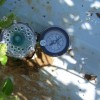 A tensiometer is a simple and relatively inexpensive tool that can be used to schedule irrigation in Miami-Dade County vegetable crops. Tensiometers continuously measure soil water potential or tension. If the tension in the soil is high, plants have to use more energy to extract soil water. If tension in the soil is low, then plants have lower energy requirements to extract soil water. This 6-page fact sheet was written by Kati W. Migliaccio, Teresa Olczyk, Yuncong Li, Rafael Muñoz-Carpena, and Tina Dispenza, and published by the UF Department of Agricultural and Biological Engineering, December 2012.
A tensiometer is a simple and relatively inexpensive tool that can be used to schedule irrigation in Miami-Dade County vegetable crops. Tensiometers continuously measure soil water potential or tension. If the tension in the soil is high, plants have to use more energy to extract soil water. If tension in the soil is low, then plants have lower energy requirements to extract soil water. This 6-page fact sheet was written by Kati W. Migliaccio, Teresa Olczyk, Yuncong Li, Rafael Muñoz-Carpena, and Tina Dispenza, and published by the UF Department of Agricultural and Biological Engineering, December 2012.
http://edis.ifas.ufl.edu/tr015